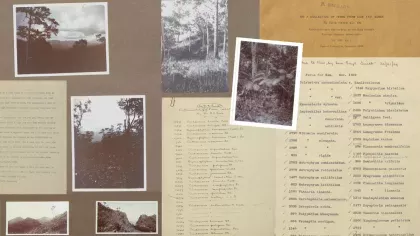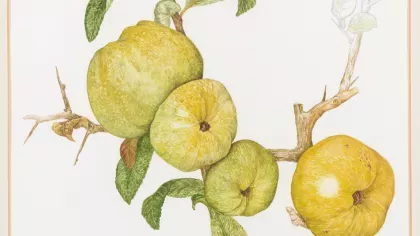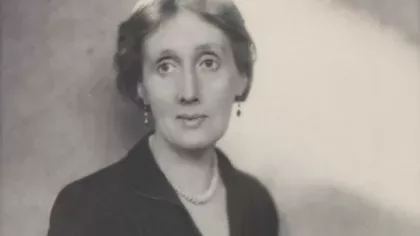6 March 2016
The rediscovery of the HMS 'Erebus' and the Joseph Hooker connection
The wreck of HMS 'Erebus', one of Franklin's Arctic expedition ships has been rediscovered. So let's here about an earlier successful expedition by the 'Erebus' - to Antarctica

The rediscovery of the HMS 'Erebus'
Listening to the news on the radio a few weeks ago I was excited to learn that one of the long-lost ships from the ill fated Franklin expedition to the Arctic had been found after well over 150 years buried in the ice. More recently it has been confirmed by the Canadian exploration team that the wreck is that of the HMS 'Erebus' (rather than sister ship the Terror).
This is a find of great historical interest in its own right but the name 'Erebus' particularly caught my attention because there is an unexpected Kew connection to the lost vessels. The ships had a long service history before their ultimate ruin on the Franklin expedition in 1845 and this included carrying the James Clarke Ross expedition to Antarctica, which was also the first major expedition of botanist Joseph Hooker. Hooker was Kew's most illustrious Director, shepherding the Gardens through a Victorian golden age. He was also an intrepid traveller who travelled to every continent during his career in constant pursuit of botanical knowledge.
Joseph Hooker's first expedition, as a young man of 23, was to the most inhospitable of continents - Antarctica. Since reading about Captain Cook's travels and Charles Darwin's account of his journey on the Beagle, Hooker had been keen to go on his own voyage of discovery. He was unable to travel as a gentleman naturalist of means, as Darwin had. However in 1839, as a recent graduate with a degree in medicine, Hooker was able to sign up to the expedition as assistant surgeon under Captain Ross on the now rediscovered 'Erebus'. At the time there was a strong connection between botany and medicine, as the study of plants was an inherent part of a medical degree, but botany could not be studied as a separate discipline.
During the Ross expedition of 1839-1843, on which Hooker was a lowly assistant surgeon, much of the previously uncharted coastline of Antarctica was mapped. Many previously unknown islands were also discovered, including one later named Ross Island, and on it the volcanoes Mount Erebus and Mount Terror - which were named after the expedition ships.
During the expedition young Hooker had the duties of an assistant surgeon to attend to, but his passion was for the natural world, especially botany of course, and in his spare time he made observations and collections. His travel journal, numerous expedition notebooks and plant specimens survive in Kew's Archive and Herbarium
The Joseph Hooker Correspondence Project is also digitising and transcribing the letters Hooker wrote during his Antarctic odyssey. This work is currently underway and the letters will be available online in 2015. Letters from Hooker’s expedition to India are already available on the website, shortly to be joined by correspondence relating to his botanical tour of the USA.
In one Antarctica letter, recently transcribed by one of the project's volunteers, Hooker describes his normal routine while on board the 'Erebus'. Life probably wasn't all that different for the men of the Franklin expedition - though they were in the equally inhospitable atmosphere of the globe's other pole.
"At ½ past 7 all turn out to breakfast which is over at ½ past 8, after breakfast the sick are attended to. From 9 when I take the Dewpoint until 12 I am my own master. during this time I have some calculations for the captain to make in a sort of Meteorological Journal. At 12 the hands are piped to dinner. I take the Dewpoint again, dine & after dinner go to draw as by that time the towing net has generally yielded something. We never take tea, but sup at ½ past 7 from which time to 11 or 12 I am most generally drawing or describing in the Captain's Cabin, the evening between 6 -- 9 being the most productive time for Marine Animal culle[?], my work sometimes does not begin till then, & when it does, it is often no joke, the specimens being minute & they will not keep to be worth examining next morning -- This is my general routine of sea life, any thing but monotonous, besides which at times there are my Journals to make up[,] notes to copy, plants to change & the like...with one haul we drew up 30 different kinds of animals, corals. shrimps, crabs, red blooded worms, sponges & no sea weed or any trace of a submarine vegetation, which grievously disappointed me" [JDH/1/2/28]
Though Hooker found nothing botanical in the nets that day, there are plants of interest to be found in the Antarctic, especially lichens, on which Joseph Hooker made extensive notes and drawings. The expedition also spent time in New Zealand, Tasmania and many of the Southern Ocean Islands and Hooker later wrote floras for these regions.
The Ross expedition of course proved successful and fruitful, and the ships returned home with Hooker safely on board in 1843. Hooker returned to the welcome news that his father had been made the first official Director of the Royal Botanic Gardens, Kew (Joseph Hooker would succeed his father in 1865). But it all could have ended in disaster for the 'Erebus' and for Hooker. Travel in the unchartered waters of the Southern Ocean was incredibly dangerous and the 'Erebus' survived such hazards as being trapped in the changing ice flows, gales and stormy seas, collision with icebergs and at one point barely surviving a violent collision with the HMS 'Terror'.
Captain Ross describes one of the storms the 'Erebus' weathered and the near destruction of the ship in his published account of the voyage:
"Soon after midnight our ships were involved in an ocean of rolling fragments of ice, hard as floating rocks of granite, which were dashed against them by the waves with so much violence that their masts quivered as if they would fall at every successive blow; and the destruction of the ships seemed inevitable from the tremendous shocks they received... The awful grandeur of such a scene can neither be imagined nor described, far less can the feelings of those who witnessed it be understood. "
Having survived this near miss in the Antarctic the good ship 'Erebus' and those who sailed in her under Captain Franklin were not to be so lucky in the Arctic. With the rediscovery of the wreck, perhaps now we will find out more about just what happened to Franklin and his men. I hope you will come back to the Joseph Hooker Correspondence Project to find out more about Hooker's own polar adventure when his letters go online.
- Virginia-


